Your guide to recently released books, CDs and other teaching resources. For additional reviews of French-language resources, visit Lu, vu, entendu. With the exception of some classroom sets, items reviewed are available on loan from the Margaret Wilson Library at the College. Contact Olivia Hamilton at 416-961-8800 (toll-free in Ontario 1-888-534-2222), ext 679, or e-mail library@oct.ca.
Children, their World, their Education
edited by Robin Alexander
How do children live, think and learn during their early and primary years?
This is one of the central questions that a group of independent researchers sought to answer during a three-year review of primary education in England. The numerous findings of the Cambridge Primary Review, the most comprehensive review of primary education in England in the past 40 years, are presented in this complex and lengthy volume edited by Robin Alexander, director of the review and a professor emeritus of the University of Warwick.
Since a series of 31 interim reports resulting from the review have already been released and have stolen much of the thunder from this recently published volume, interest in this book may be limited to education researchers and policy-makers. For those stalwart readers who do manage to read the almost-600-page tome, the text is well organized and logically sequenced into five parts. The report – which is available from the College library like all the other resources reviewed here – provides a clear context for the study and sets out the main themes that are explored: children and childhood, the experience of primary education and the system of primary education.
The last section provides a series of conclusions and recommendations that are presented in contexts that are set out earlier in the book, and they reflect the findings of the review. Recommendations include a call for supporting learning for vulnerable children, conducting a full review of Special Education needs, reversing the trend toward the centralization of education and diversifying the routes for initial teacher preparation.
Some salient sections of the report, which may be of particular interest to Ontario educators as we prepare for the implementation of early learning, address the development of a new primary curriculum and the discussion of early learning and school-start age.
Readers with limited time who are interested in the findings of the review and reactions to it can find the many media reports that surrounded the release of the book and the interim reports at www.primaryreview.org.uk.
Children, their World, their Education: Final Report and Recommendations of the Cambridge Primary Review, Routledge, London and New York, 2009, softcover, ISBN 978-0-415-54871-7, 592 pages, US$57.95, tel 1-800-665-1148, www.routledge.com
Michael Salvatori, OCT, is the College’s Registrar.
 Teach Like a Champion
Teach Like a Champion
by Doug Lemov
This is the only book you need to take your teaching from mediocre to great or from great to stellar. It is the product of Doug Lemov’s intensive search for the magical ingredients that make up an extraordinary teacher. A self-described data geek, Lemov methodically sought out those ingredients by locating the best teachers he could find. For thousands of hours, he stood at the backs of their classrooms watching them work, compiling their test scores and analyzing their teaching moves. Here’s what he found: well-prepared teachers with high expectations who, working with common tools, built powerful systems of classroom culture. In other words, he discovered that great teachers are made, not born. What may appear to be innate genius or some special DNA for charisma is, in fact, deliberate technique that, with hard work, you too can master.
Lemov offers 49 concrete, specific and immediately actionable techniques clustered into several themes like raising academic and behavioural expectations, structuring and delivering lessons, creating a vibrant student culture, and building character and trust. He also discusses pacing or creating a positive rhythm in your classroom and how to encourage critical thinking. In addition, he focuses on the essential skills for teaching reading. Many of these techniques can be seen by watching the remarkable videos included on the accompanying DVD.
The focus on technique and its constant refinement is the path to excellence, he says. That, coupled with the aggregate wisdom of champion teachers is sufficient to change the equation of opportunity in schools and close the achievement gap.
I have not come across any book that so clearly and persuasively addresses how to systematically become a great teacher. This is it. Read it.
Teach Like a Champion: 49 Techniques that Put Students on the Path to College, Wiley, San Francisco, 2010, softcover, ISBN 978-0-470-55047-2, 352 pages plus DVD, $33.95, tel 1-800-567-4797, Canada@wiley.com, www.wiley.com
Wendy Harris is the Reviews Editor for Professionally Speaking.
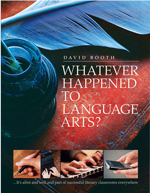
Whatever Happened to Language Arts?
by David Booth
In his inspiring new book, David Booth answers the title’s question with an emphatic response: Language arts are alive and well and flourishing. To support his claim he traces how reading and writing instruction has evolved over the years – where we were, where we are and where we can go in teaching literacy.
Drawing on almost half a century of his own experience, Booth explores the evolution of today’s successful literacy programs. He highlights the importance of innovative teachers who integrate the old and the new into their classrooms, incorporating fresh ideas like digital learning or literature circles while retaining what has worked in the past, like phonics or whole-language techniques. Each chapter begins with a peek inside a modern classroom where a remarkable teacher is engaged in an extraordinary literacy lesson. Armed with a variety of strategies, such as the use of theatre, graphic texts and the application of fiction in all subject areas, teachers are able to engage and motivate even their most reluctant readers.
Booth shows how the wireless world has made available a vast array of ideas and strategies that we can implement almost instantly in our classrooms. In addition, interactive web sites and social networks connect us to educators with whom we can exchange ideas. The book offers much to new and veteran teachers alike, providing a comprehensive collection of the successful strategies of the past as well as a road map for current innovations in theory and practice.
Whatever Happened to Language Arts? Pembroke Publishers, Markham, 2009, softcover, ISBN 9181551382456, 172 pages, $24.95, tel 905-477-0650 or 1-800-997-9807, www.pembrokepublishers.com
Dorothea Bryant, OCT, teaches language arts to Junior and Intermediate teacher candidates at the University of Windsor’s Faculty of Education.
 The Teacher’s Ultimate Stress Mastery Guide
The Teacher’s Ultimate Stress Mastery Guide
by Jack Singer
This book empowers teachers to harness the skills they need to face stress both in and out of school, as many demands pull them in different directions. As well, it shows them how to build resilience and emotional strength to prevent total burnout.
Seventy-seven easily applied remedies are offered to help teachers regain mental and emotional equilibrium. Each chapter is loaded with classroom stories, behaviour tips and practical strategies and advice, backed up by compelling research.
For example, the first remedy is to take care of your physical health to boost your psychological immunity to stress and the fallout from it – a well-known strategy with proven results. Other tips and prescriptions teach you to buffer against stress and to master those stressors that insinuate their way into your life. Much of the advice can be extended to everyday pressures outside the school setting to help lead you along the path of health and happiness. This is an easy and enjoyable read with many thought-provoking ideas and suggestions, and I recommend it for every teacher’s personal bookshelf.
The Teacher’s Ultimate Stress Mastery Guide: 77 Proven Prescriptions to Build Your Resilience, Corwin Press, Thousand Oaks, CA, 2010, softcover, ISBN 9781412970938, 200 pages, US$31.95, tel 1-800-233-9936, order@corwin.com, www.corwin.com
Majella Atkinson, OCT, teaches Grade 8 at St. Pius X Catholic School in Toronto.
 Boys Adrift
Boys Adrift
by Leonard Sax
The number of young men living with their parents is twice what it was 20 years ago. The “failure to launch” among this 22-to-34-year-old cohort has become epidemic in North American culture. In this timely book, author Leonard Sax suggests five factors that have contributed to this phenomenon.
First, he points to brain research showing that a five-year-old boy is at the same developmental level for language as a three-and-a-half-year-old girl, clearly indicating that boys are rarely developmentally ready for reading and writing in Grade 1. As a consequence, boys become frustrated not only with literacy in the primary years, but with learning and school itself.
Video games are another factor draining boys and men of their motivation, says Sax. He writes about “the will to power” that all males feel and how this need is intensely satisfied by video games. The problem, of course, is that video games do not occur in the real world, rendering their conquests empty. Males are heroes in cyberspace but “slacker dudes” in real life. Attention deficit disorder medications also come under fire as Sax cites research showing how these drugs may damage the part of the brain that is responsible for translating motivation into action.
The fourth factor he examines is endocrine disruptors found most commonly in plastics. These environmental estrogens accelerate puberty in girls but delay it in boys, leading to lower sperm counts and lack of drive. Finally, Sax expresses deep concern about the absence of positive male role models, not only in the media but in the actual lives of boys. “To be a man, a boy must see a man,” he says.
This is essential reading for teachers and parents.
Boys Adrift: The Five Factors Driving the Growing Epidemic of Unmotivated Boys and Underachieving Young Men, Basic Books, New York, 2009, softcover, ISBN 9780465072101, 267 pages, $17.00, tel 1-800-343-4499, www.basicbooks.com, also published on NetLibrary at legacy.netlibrary.com
Michael Reist, OCT, is head of the English department at Robert F. Hall Catholic SS in Caledon East.
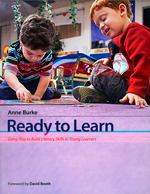
Ready to Learn
by Anne Burke
This book is essential reading for anyone new to teaching kindergarten or those who are looking for new ways to promote literacy in young children using authentic play experiences. Based on the premise that children’s play is one of the foundations of literacy building, Anne Burke suggests that abandoning it in favour of the perceived benefits of an academic program is misguided. Instead, she advocates reconnecting children’s play to curricula and pedagogical practice.
True, the outcome of play is difficult to quantify, but teachers must learn how to observe specific learning moments. Burke proposes that play-based centres can activate meaningful, open-ended play and creative conversations. These might include a museum, the eye doctor’s, a café, pet hospital, garden or news centre. Science centres might feature chemistry, biology and the environment. Booklists, web sites and suggestions for parents to increase literacy skills at home are recommended.
Burke has compiled a comprehensive resource that gives solid explanations of the work of theorists such as Vygotsky, Piaget, Marie Clay, Elkind, Sutton-Smith and Smilansky. She presents recent findings of American-based researchers Miller and Almon from the Alliance for Childhood and the Canadian Language and Literacy Research Network. The research may appear heavy going at first, but once engaged, readers will find it practical and user friendly.
Ready to Learn: Using Play to Build Literacy Skills in Young Learners, Pembroke Publishers, Markham, 2010, softcover, ISBN 9781551382494, 128 pages, $24.95, tel 1-800-997-9807, www.pembrokepublishers.com
Sarah Lynn Frost Hunter, OCT, is an early literacy teacher for primary students in the Peel DSB.
 Pulling Together
Pulling Together
by Leyton Schnellert et al
New teachers are often so overwhelmed by the daily delivery of content and assessment that they fail to see the big picture. They have little time to think about how their lessons fit into the journey of the class as a group. Pulling Together shows teachers how to organize an annual plan for a secondary English class.
Written by four British Columbia teachers who work with the same curriculum strands and assessment as we do in Ontario, the book takes the form of a staff room conversation. The teachers implement a customized plan for different groups of English students. They use assessment tools to track and support the students’ growth, and based on their assessments they revise their annual plan as a group. They model the how for their students, using high-support approaches (talk-alouds and shared writing) as well as low-support levels (guided and independent study).
The book illustrates the best practices of experienced teachers who work well together. It provides chapter after chapter of strand units, assessments, processes and summative rubrics.
Pulling Together: How to Integrate Inquiry, Assessment, and Instruction in Today’s English Classroom, Pembroke Publishers, Markham, 2009, softcover, ISBN 9781551382371, 160 pages, $24.95, tel 1-800-997-9807, www.pembrokepublishers.com
Kara Smith, OCT, teaches and develops English-language arts for the Faculty of Education at the University of Windsor and is a language consultant with several boards of education in southwestern Ontario.
A World Full of Ghosts
by Charis Cotter
illustrated by Marc Mongeau
Elementary school teachers could have a lot of fun with this book of 26 short ghost stories.
Do you know about the duppy ghost from Jamaica or the nuggle from Scotland? I sure didn’t.
The ghost stories in this book come from all over the world, and each is rated according to its level of scariness. Skeletons, children, noisy animals, ancestors and many others all show up as ghosts in these stories. Not all of them are scary. Some are humorous – hungry for candy or wanting to party – and some are helpful.
I loved the stories based on first-hand accounts of people’s experiences of ghosts, which the author calls true stories.
The stories are a great read and none of them are too terrifying. Teachers could develop a range of lessons derived from them. For example, students could be challenged to write and illustrate their own ghost stories after talking with members of their families and researching ghosts in their own cultural backgrounds.
There is a lot of potential for lively discussion and the book would be suitable for many grades.
A World Full of Ghosts, Annick Press, Toronto, 2009, softcover, ISBN 9781554511822, 48 pages, $10.95, distributed by Firefly Books, tel 416-499-8412 or 1-800-387-6192, www.fireflybooks.com
Rosemarie Chapman is a retired teacher who taught for the Hamilton-Wentworth Board of Education.
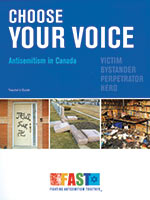
Choose Your Voice (resource kit)
Canadian Jewish Congress
This resource kit (teacher’s guide and DVD) takes aim at intolerance, bigotry, stereotypes and the impact of prejudice in Canada. It shows teachers how to instruct their students on these subjects using a variety of activities, discussion topics, articles, graphic organizers and a resource list. Materials are prepared for students in Grades 6, 7 and 8 and tie in with the learning expectations for those grades, although they can be adapted for other grades. The kit also contains ideas to adapt for exceptional students and English-language learners. The activities are stand-alone or can be part of a multi-lesson unit or even integrated with other subjects.
The scope of this resource is wide-ranging and deep. It helps teachers to delicately discuss the “isms” of society and the roles (perpetrator, victim, bystander) that students can find themselves in. The first three activities examine media fact sheets about actual cases of stereotyping, prejudice, racism, anti-Semitism, perpetrators, victimization and hate crimes. The fourth is action oriented, where students learn about Canadian heroes and create posters to inspire others to become involved in making our world a better place.
This is a valuable Canadian resource on a critically important topic. Due to the sensitivity of the material covered, teachers should ensure that students are able to speak in discussion groups safely and listen to the ideas of others with respect.
Choose Your Voice: Antisemitism in Canada, FAST (Fighting Antisemitism Together), Toronto, 2008, teacher’s guide and DVD, free, www.fightingantisemitism.com (also available in French)
Cindy Matthews, OCT, is a vice-principal in the Rosemount family of schools in Kitchener.
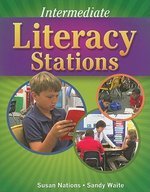
Intermediate Literacy Stations
by Susan Nations and Sandy Waite
More than a year’s supply of activities, strategies and assessment tools directly targeting the development of proficient and sophisticated readers is included in this stellar resource for intermediate learners. Reading, writing, speaking, listening and viewing are all given their due in this highly social program designed to create and maintain literacy stations.
The first part of the book outlines the basics for organizing literacy stations, where students are encouraged to rely on each other to answer questions and build knowledge. The second part provides teachers with all the needed materials for step-by-step student activities. Differentiated tasks for struggling students are incorporated into the framework of each literacy station as are enriched materials for above-level students. All activities are open-ended, engaging and encourage investigation by all students within the group.
I found this book to be an exceptional resource, particularly for the beginning teacher. A catchy title is suggested for each station – how about heading over to the karaoke station? – and the titles, along with a host of other ideas and materials, can be downloaded from a companion web site. Assessment tools are suggested, and language across the curriculum is supported, with connections demonstrated through each station. The use of technology is encouraged through the many tasks outlined. Whether you are a beginning or experienced teacher, this sharp focus on literacy within a co-operative learning structure will save you time and enrich your program. Don’t begin your language arts program without it!
Intermediate Literacy Stations, Maupin House Publishing, Gainesville, Florida, 2009, softcover, ISBN 978-1-934338-42-1, 193 pages, US$24.95, tel 1-800-524-0634, www.maupinhouse.com
Dorothea Bryant, OCT, is a retired educator who teaches language arts to junior and intermediate teacher candidates at the University of Windsor’s Faculty of Education.
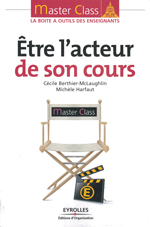
Être l’acteur de son cours (Running the Ship)
by Cécile Berthier-McLaughlin and Michèle Harfaut
This work encourages teachers to self-question and contains a thousand and one little tips for doing so in different ways. The authors tackle a number of topics, including classroom management, the teacher’s appearance and the workspace. Whether you are a new teacher or a veteran, the toolbox provided here will be invaluable if you are looking to improve or change your style.
According to the authors, the key to banishing boredom for both students and teachers is variety. Their objective is to make us realize that we are the ones in charge of our classes, and we need to acquire expertise if we are to capture our students’ attention and avoid inappropriate behaviour in the classroom. The book has a light touch, the ideas are straightforward and the advice is good, easy to follow and, above all, easy to put into practice. The boxed tips are relevant and the 20 summary sheets will help teachers quickly put together the content that is most useful to them.
The articulation exercises at the end of the book are fun and practical; they will be useful for starting the classroom day on a humorous note. A list of reference works on theatrical, vocal and relaxation techniques will help with the self-improvement process.
Some books have a special place in our hearts and on our library shelves. This book may be one of those for you. It is a fantastic tool for easing our minds and bodies and helping us give the best performance possible. Students, teachers and associated professionals will all benefit.
Another title in the same collection is Cours et supports: l’art de préparer sa classe (The Art of Preparing a Class).
Être l’acteur de son cours; Éditions d’Organisation, Paris, 2008, ISBN 9782212541083, 150 pp, $34.95, Socadis, client@socadis.com, www.socadis.com
Gilberte Bissonnette, OCT, is a secondary school teacher in a PANA (Programme d’appui aux nouveaux arrivants) homeroom class at école Le Carrefour in the conseil des écoles publiques de l’Est de l’Ontario, in Ottawa.
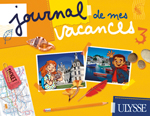
Journal de mes vacances (What I Did on my Vacation)
by Marc Berger and Pascal Biet
What an exciting way to encourage students to write and reflect in French during their vacation. I recommend this slim volume, packed with pictures, jokes, puzzles and vocabulary, to any teacher wanting to award a prize for academic achievement at the end of the year, or for any student who likes to write.
It gives kids all sorts of writing choices: copying out recipes, discussing the sports they have played and the music they have enjoyed, describing the plants they have gathered and dried, listing the places they have visited, and so on. As we know, the more varied your students’ reading and writing choices, the more successful they are likely to be.
Each topic covered in this charming book includes brief instructions. There are also some 20 pages for a detailed, day-to-day description of the vacation. The pages at the end are crammed with games like sudoku puzzles, mazes, riddles, crosswords and hidden-object games. The last page features a mini address book for new friends’ contact information.
This book should delight students from Grades 1 to 4. It is filled with resources that will encourage them to dream about their vacation, whether fantasy or reality – and make it one they will never forget.
Journal de mes vacances, Ulysse, Montréal, 2008, ISBN 9782894647943, 64 pp, $14.95, commande@ulysse.ca, www.guidesulysse.com
Ramona Dempsey, OCT, is a learning consultant in literacy and French Immersion for the York Region DSB.

